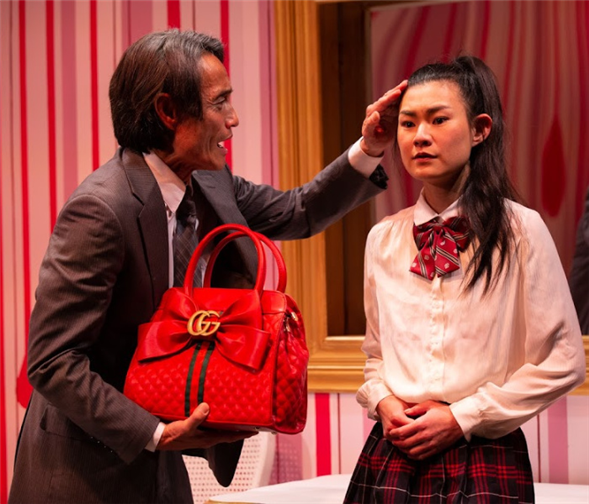Translate Page

After a successful engagement at The Bushwick Starr in spring 2019, Suicide Forest is having an encore run at the A.R.T./New York Theatres from February 25 to March 15.
Playwright-performer Haruna Lee examines the duality of immigrant identity in Suicide Forest
---
Intergenerational and cultural tensions, misogyny and trauma are the entangled themes explored in Suicide Forest, an experimental play interrogating Asianhood and assimilation. Currently running at Brooklyn's The Bushwick Starr in association with Ma-Yi Theater Company, the show takes its name from Aokigahara, the infamous Suicide Forest of Japan, where the main characters' lives intertwine.
Lifting inspiration from another surreal odyssey of selfhood, Adrienne Kennedy's Funnyhouse of a Negro, Suicide Forest is located in a nightmare 1990s Tokyo landscape where a doll comes to life, a salaryman subjects himself to a game show of humiliating rituals and a crimson-clad Shinigami (death deity) stares menacingly from the mirror. The narrative seems to be constructed from scattered puzzle pieces, assembling into a wider and distorted portrait of Japanese-American identity.
The playwright, Haruna Lee, also embodies the life-size doll, Azusa. At the outset, she's subservient and limp with a perpetual smile. As the play progresses, Azusa acquires a will, a conscience and agency. But although she eventually transforms into a walking, living, breathing teenage girl, she is unsure of how to exercise her newfound independence. Through her mishaps, Suicide Forest provides a searing indictment of the male consumption of idealized femininity, specifically within Japanese culture.
{Image1}
"I didn't feel so different from that kind of doll, or sex doll, small, pliant, obedient, all those different markers of Asian-American women," Lee says about her upbringing. "The way in which I carry Japan with me is that intense." Born in Hong Kong and raised in Japan and Seattle, she grew up acutely aware of being torn between two cultures. "My mother is Japanese and only speaks Japanese," Lee says. "But I went to an American school in Japan. Once I moved to Seattle, I was speaking English with my friends."
Featuring an all-Japanese-American cast, a bilingual script and a fourth wall-shattering finale, Suicide Forest mixes black comedy with tragedy as it floats from vignette to vignette. But as much as the show defies convention, Lee recognizes that "Asian-American theatre has to be digestible to a certain degree." Thus Suicide Forest is a kind of immigration tale, though it replaces the hackneyed quest for the American Dream with a nightmarish reality. Assimilation is presented as scarring, traumatic, even a black hole. "In immigration stories, we have to erase the parts that speak to our home culture because we fear our home culture is not going to be understood," Lee explains. In her eyes, assimilation isn't about becoming more American, it's about annihilating your heritage.
Lee is gratified to be working with a director, Aya Ogawa, and actors who, because of their common ethnic background, know what she's going for. According to the playwright, "They understand why I am using this character to explore and investigate this history and the way I have been treated and perceived." But while Azusa's journey may have particular resonance for theatregoers of Asian descent, Lee hopes audiences of all persuasions will see fragments of their lives reflected in this fun-house mirror meditation on identity.
---
Caroline Cao is a writer, comic writer, playwright and screenwriter. When she's not working on a script or fan fiction, she's experimenting with pasta. Follow her at @Maximinalist. Follow TDF at @TDFNYC.
Top image: Eddy Toru Ohno and Haruna Lee in Suicide Forest. Photos by Maria Baranova.
TDF MEMBERS: Go here to browse our latest discounts for dance, theatre and concerts.